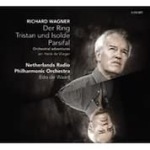Whatever you think of his operas (works of all-encompassing genius, or long-winded, tedious trash-troves), there’s little disputing that, as evidenced by this collection from Edo de Waart and the Netherlands Radio Philharmonic, Richard Wagner produced some of the finest and most original orchestral music of the 19th century.
These three “symphonic compilations” (a 3-disc set originally released on separate CDs) are arrangements by composer Henk de Vlieger. The Ring–An Orchestral Adventure does a pretty decent job of compressing Wagner’s four-opera magnum opus into 67 minutes. Those that know the story well will immediately recognize the main dramatic selections, and will easily follow along with the narrative. Even better–the unfamiliar listener will find this compilation enjoyable on its musical merits alone. De Waart has a real ear for this music, and he leads the Netherlands Radio Philharmonic in a mostly powerful rendition. It’s only at the climactic destruction of Valhalla where he lets the tension flag, sounding restrained next to Levine’s orchestral tsunami.
Tristan und Isolde–An Orchestral Passion is another success as it also reduces the opera to its core dramatic elements (for a runtime of 64 minutes). The Prelude segues right into the beginning of Act 2, where it’s nice for a change to hear the hunting horns unobscured by the voices. (We are thankfully spared King Marke’s extended guilt trip after the lovers’ discovery.) Act 3 is best–hearing the mournful prelude without voices is to suddenly recognize the seeds of Sibelius’ Swan of Tuonela. De Waart and the musicians again offer a beautifully realized performance, even if it could have done with a bit more emotional intensity in the Liebestod.
Parsifal–An Orchestral Quest is less convincing mainly because the opera does not easily lend itself to synthesis (in addition to containing great swaths of dullness). The “Parsifal” section between the Prelude and the first Grail scene sounds like so much filler, and without voices Act 2’s Flower Maiden scene loses some of its magical allure. Without an awareness of what’s going in the story, Act 3’s Good Friday music sounds like another Siegfried Idyll. The second, grimmer Grail scene comes off well enough–it’s just too bad that Vlieger left out its chilling concluding brass passage.
Of course, there always have been recordings of Wagner orchestral excerpts (“bleeding chunks”), with Szell’s and Tennstedt’s being among the indispensable. However, de Waart’s set provides an opportunity to experience this music in a more or less congruent manner without requiring you to sit through (some would say endure) the complete operas. For that, and for the largely compelling performances (and first-rate recorded sound), it earns a solid recommendation. [7/13/2011]
































